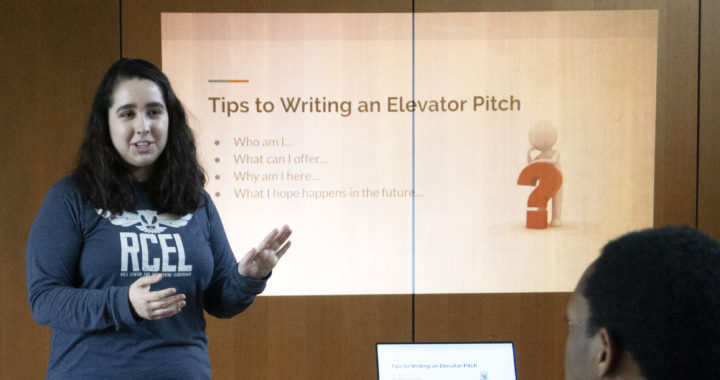by Dr. Gayle Moran
RCEL Lecturer in Professional Communication
Elevator pitch is a term that’s thrown around a lot these days. Everyone talks about the need to have one, but I have found that few people have actually taken the time to develop a strong one. After all, the thinking goes, you should be able to speak automatically about your latest project, your new company, or your goals and aspirations, shouldn’t you? These are things you’re immersed in, thinking about frequently, and the words should just come to you when the time is right.
The problem is that for many of us, words may come, but they often have no structure or organization. You may end up mumbling through an answer to the question “How is the new project going?” as you struggle to remember milestones, dates, and accomplishments. Or you may spew forth a slew of random thoughts when someone asks you what your new company is all about. If you’re a student at a job fair and a recruiter says “tell me about yourself,” you may get out more “uhs” and “ums” than real words. This doesn’t make for a good first impression.
The remedy is to be prepared with an elevator pitch that you review and update frequently. There is no one template for an elevator pitch because the topic and the situation are always fluid. But here are some guidelines that you can apply to nearly any situation. In general
- Keep your pitch at an optimal length of 30 or 40 seconds. You can write it out in about 75 to 100 words, but don’t memorize it. Just become familiar with it so you sound natural when you speak.
- Start with your name if the person you’re talking to doesn’t know you. Always include your first and last name, and say them both distinctly. Your name is often accompanied by a handshake.
- Have two to four points in mind that you want to make. These are the points that you should review and update frequently. They have to be crisp and succinct. Don’t get bogged down in details.
- It’s often relevant for students in particular to mention their experience, interests, and educational status.
- Prepare a short conclusion. Depending on the situation, this might include stressing your strengths and skills; asking for, or offering, a business card; or asking if you can set up a meeting for a longer conversation. A smile and a thank-you can go a long way toward helping people remember you.
- Stay positive, stand up straight, and make eye contact.
You may be convinced that you can speak impromptu when you need to, but don’t count on it. If you prepare and practice an elevator pitch, you’ll always come across as professional and confident, and you’ll make a memorable impression. Then, even the smallest encounter can turn into a big opportunity.
Presented by RCEL faculty, the RCEL Tip Tuesday Series addresses a variety of topics applicable to young engineering leaders, and encourages them to learn more and improve.


